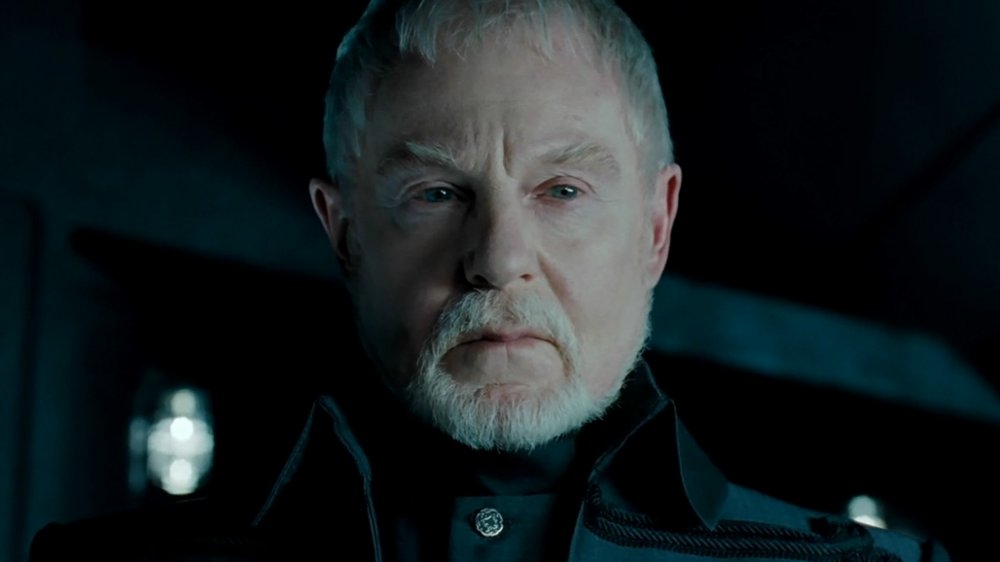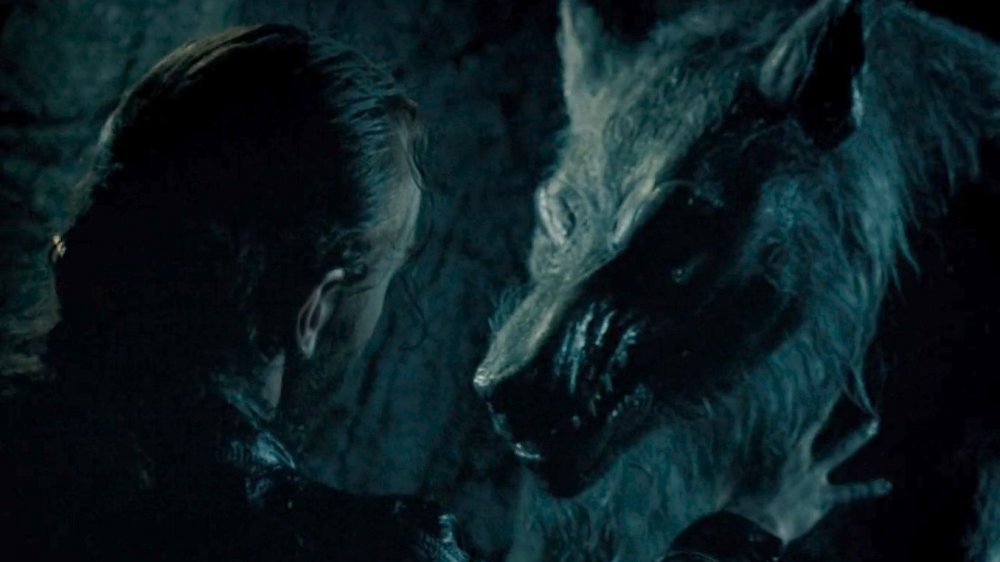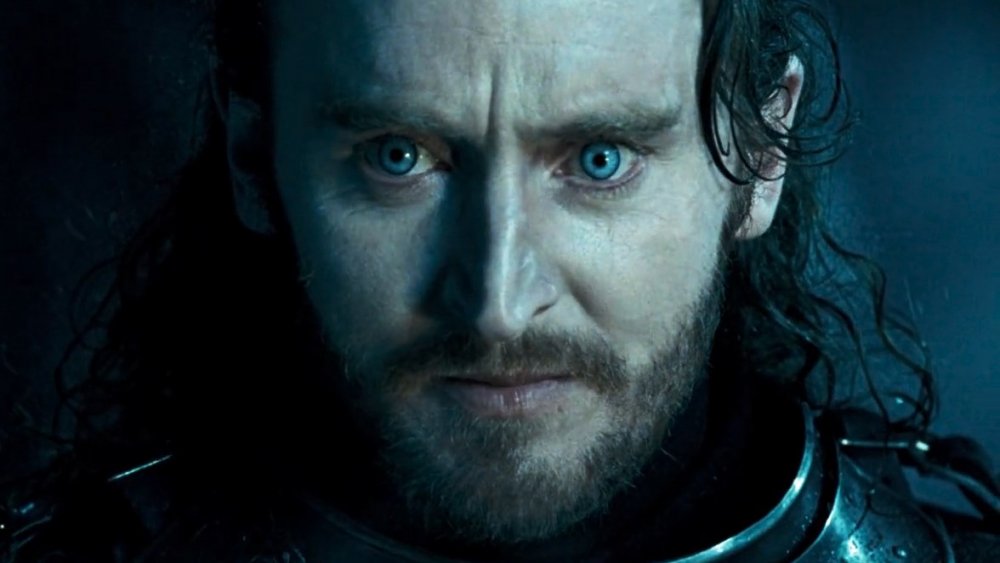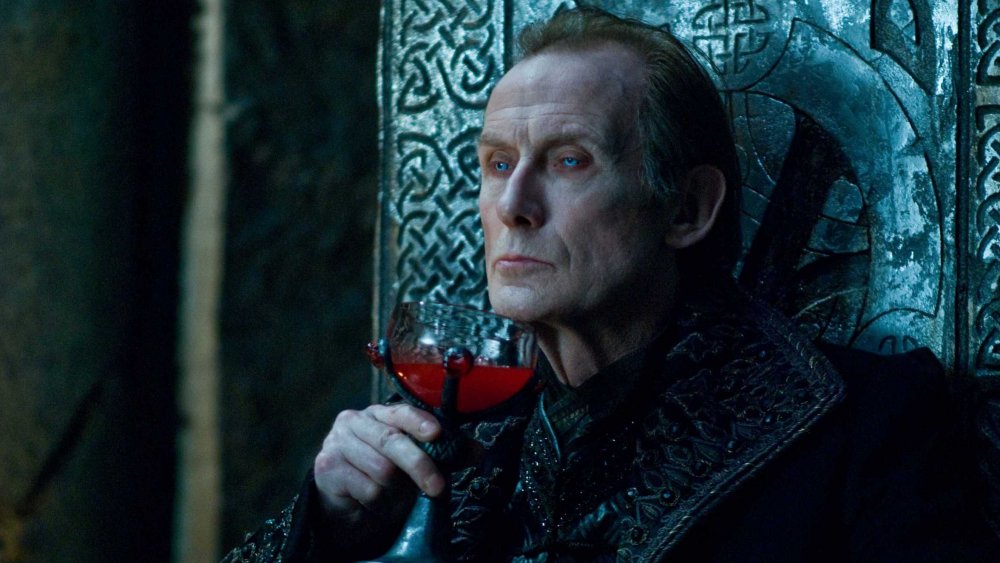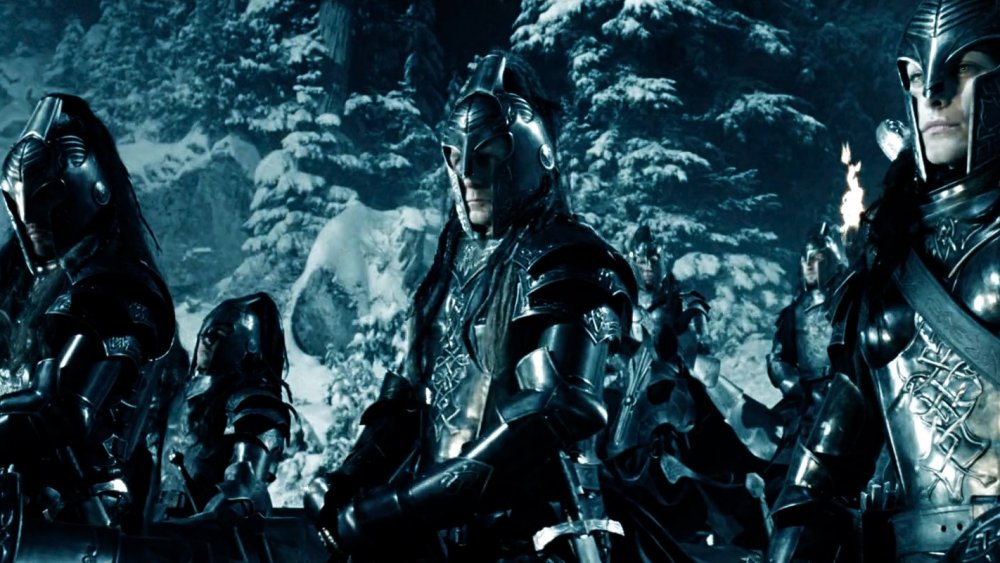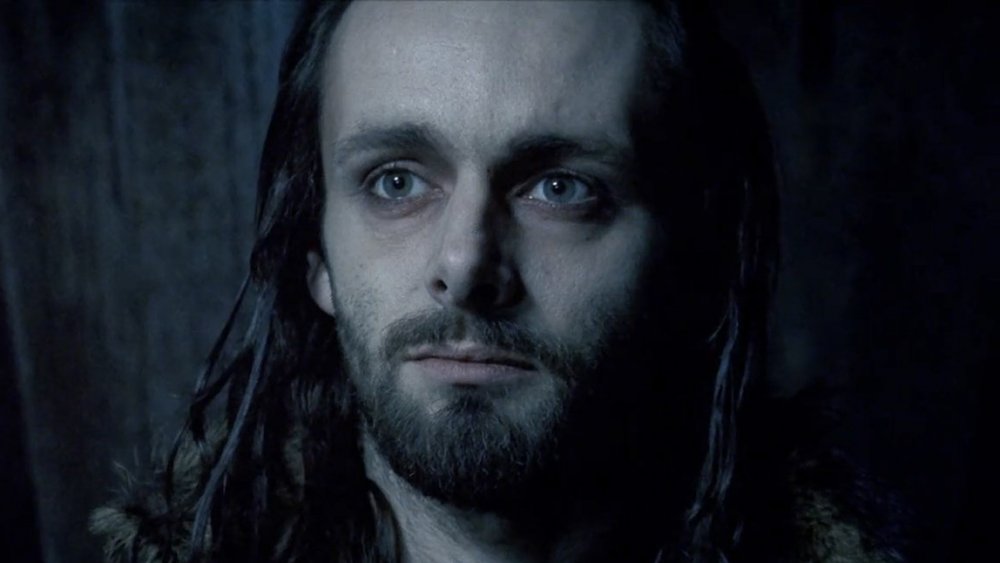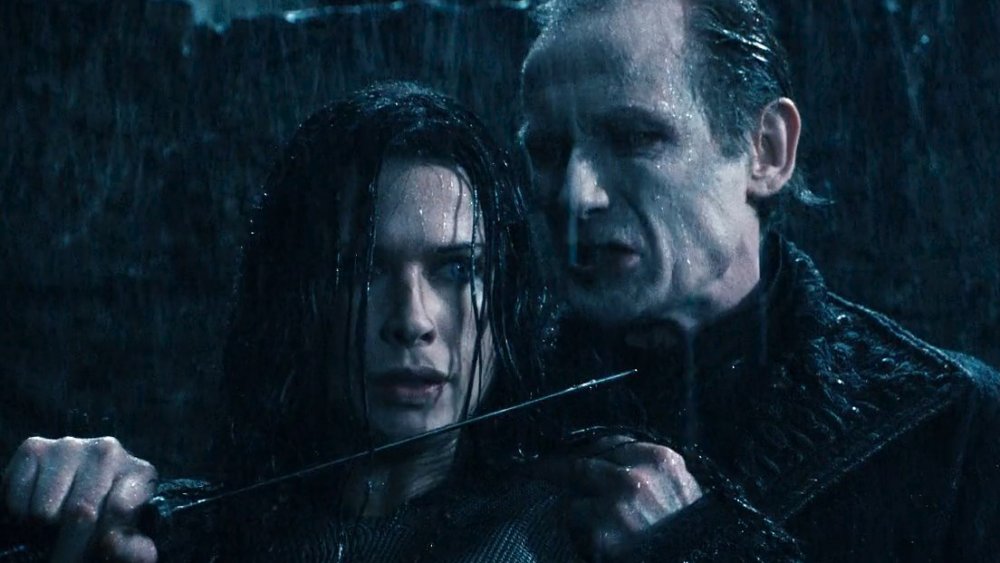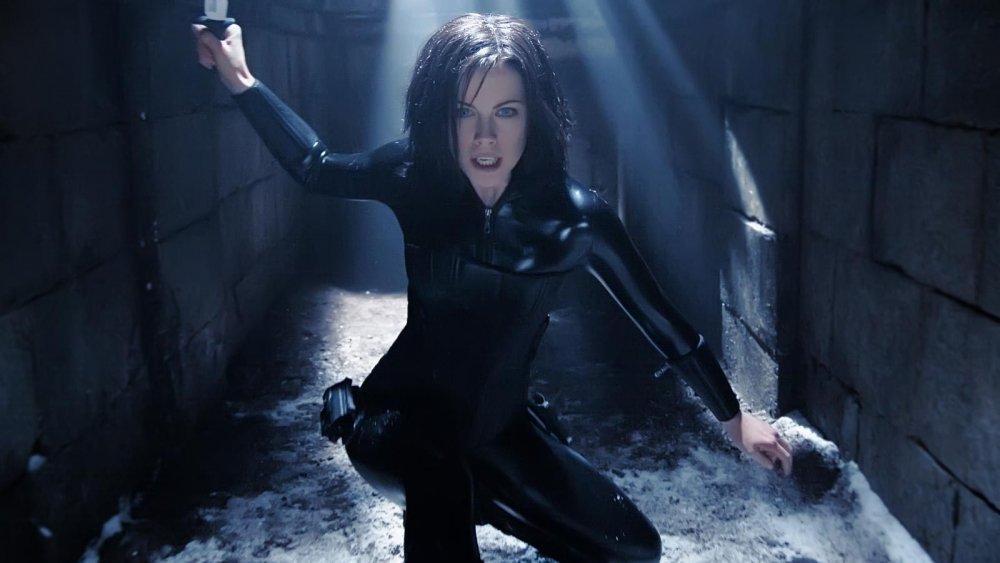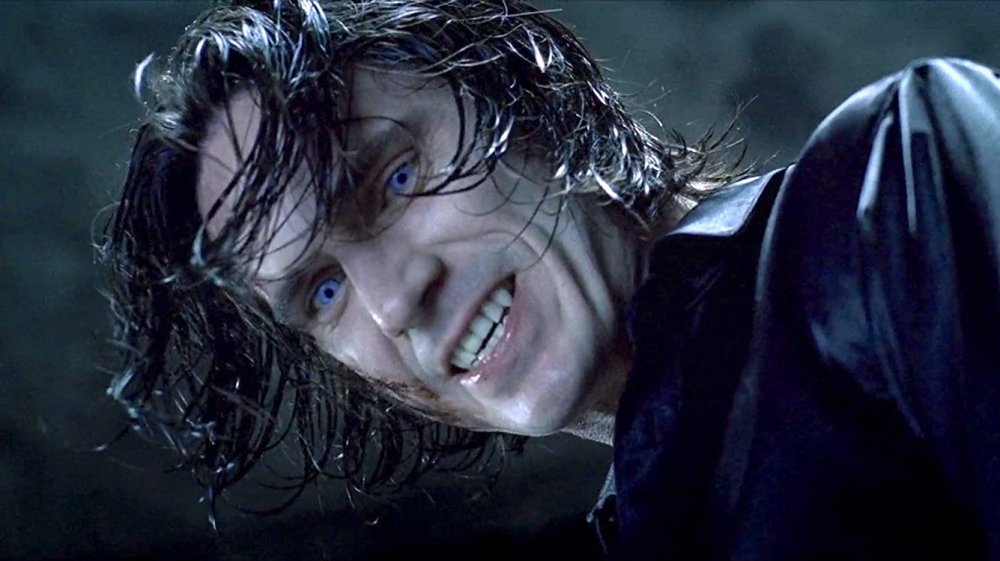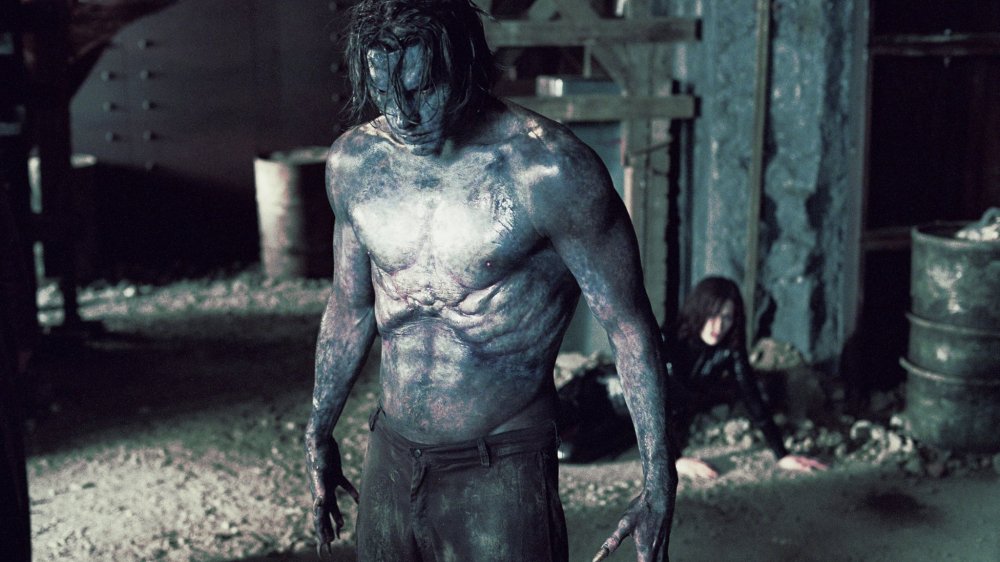The Mythology In The Underworld Series Explained
This content was paid for by Netflix and created by Looper.
Think the Underworld series is just bloody vampire-versus-werewolf action, a never-ending hail of ultraviolet bullets, and pretty people in tight leather? Think again. Oh, sure, Underworld's supernatural, Matrix-inspired action scenes might be the franchise's main draw, but look a little deeper and you'll find a complex and nuanced mythology that'll give even the densest fantasy novel a run for its money. Or, to put it another way: If you're in the mood for a political fantasy thriller like Game of Thrones, except starring classic movie monsters and with production design taken straight out of Hot Topic, you're in the right place.
Underworld's gnarled family trees and ever-shifting political alliances help set the franchise apart from its creature-feature peers, but it can be a lot to keep track of. Now, you don't need to follow all of the chatter about bloodlines and hybrids and ancient vampire customs to follow the action. All you really need to know are that vampires are (sort of) good and werewolves are (sort of) bad. But without understanding all the backstory, you're not getting the complete Underworld experience.
Thankfully, Underworld's lore isn't quite as dense as it all seems. You don't need to be a daywalker like Blade to understand it all. If need some help figuring out exactly what's going on in all of the Underworld films – and you don't mind spoiling some of the franchise's big reveals – here's everything you need to know about Underworld's monstrous mythology.
It all begins with Alexander Corvinus
Back in the early fifth century, Alexander Corvinus was just your regular, run-of-the-mill Hungarian warlord. Raze some villagers, execute some enemies, solidify power. You know how it goes. However, one day, when Alexander returned home from his latest campaign, things changed. Upon arriving back at his home village, Alexander discovered that the entire population had succumbed to a rare plague. Even worse? Before long, Alexander contracted the disease, too. He was as good as dead.
Except he wasn't. Thanks to a bizarre genetic mutation, Alexander didn't just survive the disease. It made him immortal. Thankfully, Alexander wasn't forced to live through the next handful of centuries alone, either. While his village was wiped out by the plague, Alexander passed his immortality on to his sons, the twin brothers William and Marcus, and an unnamed third child.
A happy family, however, the Corvinus clan was not. While riding in the mountains, William was bitten by a wolf, which interacted with the virus in his bloodstream and gave him special powers, essentially transforming him into the first werewolf. Shortly afterwards, Marcus was bitten by a bat, making him the first vampire. Only Alexander's third son, whose immortality lay dormant, lived a normal life — and even then, he passed his latent powers on to his offspring as a recessive trait, creating entire generations of would-be immortals.
Brother versus brother
Now, it's worth noting that William wasn't the type of creature that we'd typically call a werewolf — at least not in the way we traditionally know them. Yes, he took the form of a bloodthirsty beast who could rip regular human beings apart with ease. Yes, his bites were infectious, and turned his victims — if they lived — into werewolves themselves. However, as a result of their infections, none of these early werewolves could ever transform back into human beings. For William and his progeny, it was all-wolf, all the time.
This presented a problem for Marcus. Mentally, the werewolves were more beasts than men, and it wasn't long before they were chomping on peasants and nobles alike as they cut a bloody swath across Europe. Despite Marcus' best efforts, William couldn't be controlled. Something had to be done.
Marcus decided to raise an army and take the fight to William himself, beginning the vampire versus werewolf war. However, the twins' father, Alexander, decided on a different approach. Instead of fighting against his son, Alexander marshaled his own forces and dedicated his ever-lasting life to keeping the Immortals' existence secret. As Marcus and William's battles raged, Alexander played clean-up, using his considerable resources to keep mere mortals from learning about the conflict unfolding right under their noses.
Not your regular vampires
Before we get too far, it's worth noting that Underworld's versions of vampires aren't exactly like the ones you normally find in books, movies, and TV shows. The basics are the same — these are still immortal beings who feed on blood. But Underworld's vamps have a variety of powers and abilities that you won't find anywhere else. These ain't your typical movie Draculas, nor are they your living vampires like Morbius from the funnybooks.
For one, Underworld's vampires don't need human blood to survive. Animals will do just fine, as will sips of other vampires. For another, the Underworld vampires can't change into bats or other animals, although ultra-powerful ones like Marcus can assume a monstrous, winged form. Instead, Underworld's undead have super-strength, heightened reflexes, and an accelerated healing factor. Sunlight will still cook vampires to a crisp, but silver — sometimes depicted as a vampire-hurting substance — seems to only be a weakness for Underworld's werewolves. You also can't be a vampire and a werewolf at the same time. With a couple of rare exceptions, werewolf bites are fatal to most vampires, and vice versa.
More importantly, for these vampires, drinking someone else's blood isn't just a form of nourishment. It also lets them relive the victim's memories, a skill that's often used to tell whether or not the target is telling the truth. If a vampire has special powers — like, say, immunity to sunlight — sharing their blood will pass those abilities on to others. Finally, even though they're technically dead, Underworld's vampires can still mate and have children, who also end up as vampires, naturally. Given Underworld's focus on legacy and bloodlines, that last point is very, very important.
The Vampire-Werewolf war rages on
If you're going to fight a war, you need an army, and as the vampire-werewolf conflict began to heat up, Marcus knew exactly where to find one. Viktor, a ruthless warlord known for his cruel and overbearing demeanor, was nearing the end of his life when Marcus approached him with an offer he couldn't refuse. Marcus wanted Viktor's military expertise and his expansive army. Viktor didn't want to die. So, they made a deal: Marcus turned Viktor and his followers into vampires, making them immortal — sort of like a whole bunch of really intense vampire facials for Viktor and all his pals. In return, Viktor devoted his army to Marcus' cause.
The Vampire-Werewolf war lasted for centuries. The werewolf hoards began to grow, while Viktor's soldiers, now known as Death Dealers, grew increasingly skilled at putting the beasts out of their misery. Finally, the conflict came to a head in 1202 A.D when Marcus, Viktor, and a third elder vampire named Amelia tracked William to a remote village. After launching a swift and brutal attack, the vampiric forces took William hostage, although not without suffering a number of casualties.
However, Viktor wounded William in the attack, enraging Marcus. Now, Marcus couldn't challenge Viktor directly — even after all of those years, the Death Dealers remained loyal to their first master — but that didn't mean that he couldn't hold a grudge. Even as Viktor sealed William away in a secret fortress and hid the two keys to his prison, Marcus vowed to free his brother and get revenge. It didn't matter how long it would take. Marcus was willing to wait.
Life in chains
At some point in the intervening years, Marcus, Viktor, and Amelia — together known as the three Vampire Elders — established the Chain, or a system that splits power equally between the trio. Under this structure, only one Elder remains active at a time, overseeing the world's various vampire covens. The other two "sleep" in their coffins, basically waiting in suspended animation until it's their turn to rule. Every hundred years or so, the Elders switch places. The current ruling Elder goes to sleep, while the next in line takes their place.
Of course, while Marcus and Amelia were asleep, Viktor found that the Chain had other benefits, too: mainly, that without the other Elders around to interfere, Viktor could solidify his power. With the help of the vampire historian Andreas Tanis, Viktor convinced the Coven that he, not Marcus, was the original vampire. He domesticated captive werewolves and used them as slaves, and ensured that the Death Dealers remained loyal to him — and only him.
In fact, Viktor would've killed Marcus as he slept and taken power outright if Marcus hadn't taken one extremely important precaution. Before he went to sleep, Marcus told Viktor that killing one of the original immortals would rob all their descendants of their powers. If Marcus died, there would be no more vampires. And if William perished, the werewolves would be finished, too.
Of course, none of that was true — Marcus was simply trying to keep Viktor at bay. But the ruse worked. Viktor was unwilling to lose either his immortality or his werewolf slaves, and decided to let William and Marcus live, content to plot from the shadows instead.
Enter the Lycans
In the early 13th century, things were going pretty well for Viktor. He was, for all intents and purposes, the most revered of all of the vampires. His daughter, Sonja, who was born just a few years after William's capture, was a fierce Death Dealer and was on the path to becoming the fourth vampire Elder. While William's defeat didn't end the werewolf threat, Viktor's rivals had been dealt a significant blow by his capture. Besides, there was no way William was getting free. Viktor had one of the keys to William's cell grafted onto his ribcage, where Marcus couldn't find it. Talk about a good hiding spot! Victor gave the other key to Sonja for safekeeping.
Everything changed when one of Viktor's slaves gave birth to Lucian, the first member of a new species of werewolf. Known as Lycans, this new breed appeared human until the moon turned full, at which point they turned into monstrous beasts. As a result, they were smarter — and easier to control — than regular werewolves. Viktor immediately saw an opportunity.
Using Lucian's blood, Viktor created an entire army of Lycan slaves to guard the vampires' stronghold from werewolf attacks during daylight hours, when the bloodsuckers weren't able to defend themselves. Even as they learned to change their form at will, Lucian and the other Lycans protected Viktor and his followers. A 200-year peace followed. And yet, even Viktor couldn't plan for what happened next: Lucian and Sonja fell in love.
The first battle in the Vampire-Lycan War
Naturally, Viktor wasn't a fan of vampire and Lycan romances, and Lucian and Sonja worked hard to keep their love affair a secret. Unfortunately, they couldn't keep Viktor in the dark forever. As Viktor became increasingly abusive towards Lucian, the disillusioned Lycan began discussing rebellion with his fellow slaves. Meanwhile, Sonja became pregnant with Lucian's baby, and the pair made plans to escape together.
Viktor caught on just in time. By drinking Sonja's blood, Viktor discovered the truth about his daughter's deception. Quickly, everything fell apart. Viktor tied his daughter to a stake and flooded the room with sunlight, forcing Lucian to watch as Sonja and their unborn child were burned alive.
After the murder, Viktor left Lucian to wallow in his misery. But that was his biggest mistake: It turns out that the moon that night was full, giving Lucian the strength he needed to burst out of his chains. Lucian stole Sonja's pendant — which was actually one of the two keys to William's prison — and rallied his forces. With the Lycans at his back, Lucian decimated the vampiric forces and took their castle for his own. And so, the Vampire-Lycan war began.
The "birth" of Selene
As the war raged on, Viktor made moves to consolidate his power. With the help of Andreas Tanis, the vampire historian, Viktor framed Lucian for starting the war, making him the vampires' sworn enemy. He also enlisted the help of a human architect to build a new prison for William — and then killed the architect's entire family when the building was complete in order to preserve its secrets.
Well, almost his entire family. The architect had a daughter, named Selene, who reminded Viktor so much of Sonja that the vampire couldn't bring himself to murder her. Instead, he transformed Selene into a vampire, then lied to her, telling her that Lycans had killed her family. Selene vowed to get revenge.
As Viktor's lies began to stack up, Tanis started to have a change of heart and began revealing the truth. In response, Viktor accused Tanis of spreading "malicious lies" and, with Selene's help, exiled him to a remote monastery. Meanwhile, Selene quickly became Viktor's most talented and prolific Death Dealer, dispatching hundreds of Lycans over the next 600 years.
The end of the Vampire-Lycan War (but not really)
However, Selene wasn't the only Death Dealer with a skill for killing Lycans. One of Viktor's original lieutenants, a vamp named Kraven, was almost as good. In fact, it was Kraven, not Selene, who officially ended the Vampire-Lycan War, although his victory wasn't quite what it seemed.
Sometime between Lucian's rebellion and the beginning of the first Underworld movie, Kraven and a group of Death Dealers invaded Lucian's castle, hoping to bring the centuries-long war to a close. It didn't go well for the vampires, who, except for Kraven, all died in the attack. However, from all appearances, it went even worse for the Lycans. In the aftermath, Lucian's castle burned, while Kraven emerged from the skirmish holding a piece of Lucian's branded skin, using it as proof of the Lycan's death.
It was a ruse. Secretly, Kraven and Lucian were working together. Kraven received all of the credit for ending the war, while Lucian and many of his fellow Lycans went into hiding, waiting for the perfect time to strike. It worked. When it was Amelia's turn to take over as part of the Chain, Viktor appointed Kraven regent of the Old World Coven, the oldest and most powerful group of vampires on the planet. As Viktor slept, Kraven made plans to take over the coven permanently — even as Selene watched very, very carefully.
It's all about the hybrids
Lucian didn't waste his time in hiding. For one thing, he teamed up with the now-exiled Andreas Tanis to develop deadly "ultraviolet bullets" that could drop vampires with a single shot. Not only that, but in his quest to topple the vampiric regime, Lucian began researching the mythical "hybrids," which combined the powers of Immortals, vampires, and werewolves into one.
Only direct members of Alexander Corvinus' genetic bloodline could become hybrids. That made William, Marcus, and Alexander himself candidates, but also meant that any ancestors of Alexander's third son, who was mortal but carried the Immortality virus in his blood as a recessive trait, were also possible hybrids. At the beginning of Underworld, Lucian is secretly hunting for the unnamed son's descendants, hoping to infuse them with both Lycan and vampire blood in order to create a new, all-powerful creature.
He's not doing this out of charity. Drinking a hybrid's blood magnifies a werewolf or a vampires' existing powers while removing their weaknesses, like sunlight or silver. Other effects are unknown. After all, when Underworld begins, the only known hybrid — Lucian and Sonja's daughter — had been killed in the womb. As far as what happens next? Well, you'll just have to watch Underworld and see.
